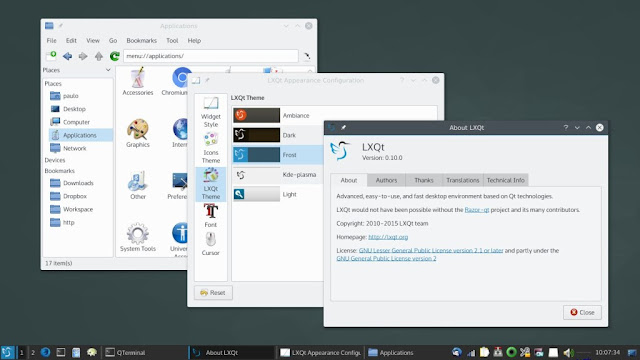The LXQt team has announced release of LXQt 0.11, latest stable release of lightweight desktop environment that makes use of well established Qt framework. LXQt project is an attempt to rewrite LXDE desktop using Qt framework instead of Gtk+.
The LXQt 0.11, current release of project is coming almost one year after previous stable release, LXQt 0.11 due to various reasons. However the team promises that, the release process is revised thoroughly so that, newer versions can be shipped frequently to provide frequent bug fixes and feature enhancements. Also, relevant bug fixes will be ported to previous releases, if it is necessary.
The major highlights of LXQt 0.11 release can be summarized as:
The LXQt 0.11, current release of project is coming almost one year after previous stable release, LXQt 0.11 due to various reasons. However the team promises that, the release process is revised thoroughly so that, newer versions can be shipped frequently to provide frequent bug fixes and feature enhancements. Also, relevant bug fixes will be ported to previous releases, if it is necessary.
The major highlights of LXQt 0.11 release can be summarized as:
For more information, see release announcement published in projects website.
- Improved documentation to make more clarity on process to be followed while development, installation and configuration. Each repository in comes with a README.md file.
- Numerous UI related bugs were fixed to enhance user experience. Some new components were introduced and some changes regarding configuration were made.
- Under Openbox an LXQt specific configuration file
~/.config/openbox/lxqt-rc.xmlis used from now on.- Repository lxqt-config was complemented with a tool to adjust the displays’ brightness.
- lxqt-panel, the taskbar of LXQt, is now behaving well on multi-monitor systems. The main menu comes with a search feature. Its plugin-screensaver was providing the very same functionality as an invocation
lxqt-leave --lockscreen(see lxqt-session). The latter is made available as item “Lock Screen” in the panel’s main menu by a desktop entry file and can as such be dragged into an instance of plugin-quicklaunch. The plugin was therefore abandoned, to ease the transition, preexisting instances are automatically replaced by an instance of plugin-quicklaunch featuring the said desktop entry file.- PCManFM-Qt, the file manager of LXQt which is in charge of the desktop management as well, has seen a lot of improvement of its UI, e. g. the placement of icons is much better and it’s possible to store settings per folder.
- The release is introducing pavucontrol-Qt, the Qt port of PulseAudio’s mixer pavucontrol the UI of which is based upon GTK. Albeit developed for a short time only it’s already providing nearly all features of the latter.
